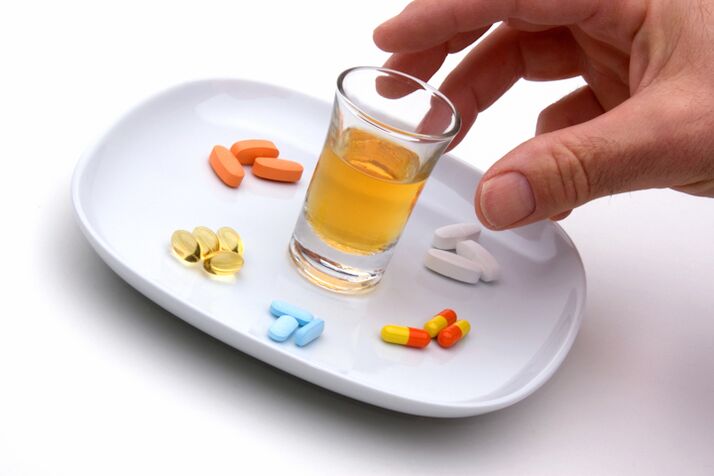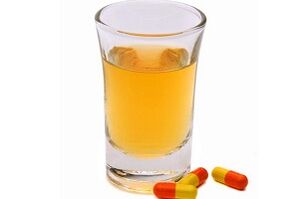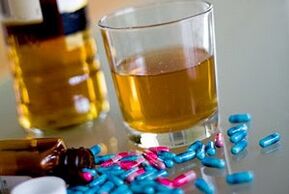Despite antibiotics, a large list of contraindications, and a wide range of side effects, they are very necessary drugs that have saved more lives. Because only antibiotics can kill the bacteria that cause dangerous diseases in the body.

In the days before the drugs were invented, many died of bacterial infections. Many diseases were considered incurable due to the lack of such drugs.
Antibiotics cannot be taken without a prescription and it is very important to follow the rules for taking them. In addition, you should know that antibiotics are not compatible with alcohol. Answers to questions about taking antibiotics are provided in this article.
Antibiotic rules
The most important rule of taking antibiotics is to use them only when it is impossible to do without them. Signs of use are symptoms of an acute bacterial infection that the body cannot cope with on its own. In order to achieve the desired therapeutic effect, antibiotics should not be taken indiscriminately.
Be sure to follow the instructions below:
- You cannot prescribe antibiotics on your own without a medical degree. Only a doctor can determine the cause of a disease - a virus or a bacterium. In the case of a viral infection, antibiotics do not help, on the contrary, they can aggravate the course of the disease;
- If you feel better, you cannot stop the prescribed treatment. Relapse of the disease may occur;
- Do not change the dose of the antibiotic during treatment. Dose reduction threatens to cause the bacterium to develop resistance to the drug, and the increase is associated with side effects or overdose;
- It is not possible to drink the antibiotic with tea, juice and especially milk, otherwise taking the drug will be useless. Milk, dairy products and fermented dairy products are not compatible with antibiotics, reducing the effect of the drug. You can drink the drug only with water, about 0, 5-1 glasses;
- You should not take antibiotics at any time at the right time. It is important that you follow the instructions for the medicine and use the medicine as described, namely: before, during or after a meal. In addition, it is important to monitor the frequency of dosing (24 times 1 time, 2 times in 12 hours, three times in 8 hours, etc. ) to obtain the desired concentration of antibiotic in the body;
- Do not combine taking antibiotics with physical activity;
- You should not drink alcohol while taking antibiotics.

Before prescribing an antibiotic, be sure to tell your doctor:
- medicines currently being taken;
- pregnancy or lactation;
- kidney or liver disease;
- diabetes.
And if previously observed:
- occurrence of side effects;
- development of allergic reactions;
- recent use of antimicrobials.
When can I drink alcohol after completing an antibiotic regimen?
Different antibiotics have different active ingredients. Accordingly, each drug has its own selection criteria from the body. In one case it is a short period and the alcohol can be consumed the next day and in the other one you have to abstain from alcohol for 7 days.
The required information is usually indicated by the manufacturer in the product information. If you are missing, you may want to wait 10 days. In addition, if the patient has kidney or liver problems, this period should be at least doubled.
How long can you drink antibiotics after alcohol?
Alcohol is completely eliminated from the body 21 hours after the last intake. After this period, you can take the prescribed antibiotics. In any case, it is better to reduce your alcohol consumption as much as possible by taking a course.
Causes of incompatibility between alcohol and antibiotics
In addition to the fact that taking antibiotics puts a significant strain on the kidneys and liver, and taking it with alcohol only exacerbates the situation because ethanol slows down the work of excretory systems, there is another important reason for the incompatibility.
All the material that enters the human body begins to disintegrate until only the original parts remain. This also happens with alcohol and antibiotics. The danger of concomitant use is that antibiotic molecules are similar to alcohol molecules. The body does not recognize it correctly, leading to failure.
Alcohol is perceived by the body as a drug, which leads to alcohol molecules being processed incorrectly by the body.
Consequences of not following the rules of antibiotic use
Violations of the rules for taking antibiotics, as well as incorrect choice of medication or improperly prescribed treatment regimen, often lead to undesirable side effects.
These include:
- Dysbacteriosis. It is caused by an imbalance between the healthy and pathogenic microflora of the body that occurs at the moment when the pathogenic bacteria begin to quantitatively exceed the bacteria that perform the body’s protective functions. Dysbacteriosis manifests itself in the form of candidiasis or recurrent diarrhea.
- Allergic reactions. The individual intolerance of the drug components plays an important role here. Allergic reactions vary, including irreversible reactions.
- Antibiotic resistance of bacteria. Pathogenic microorganisms are able to adapt to the active ingredient of the antibiotic, you just need to loosen the "catch". Reproduction continues and the disease continues accordingly.
Only a serious attitude about taking antibiotics will give the required therapeutic effect.
What antibiotics are strictly forbidden to take with alcoholic beverages?
There are antibiotics that are strictly forbidden to consume at the same time as alcoholic beverages. This information is unequivocally included in the medication comments, and the patient responsible for prescribing the antibiotic should warn the patient.
These medicines contain the following antibiotics:
- Group of tetracyclines. Formulations based on these are often used in medicine and have a broad spectrum of action;
- Chloramphenicol group. This class of drugs often causes side effects and, in combination with alcohol, may increase the toxic effects of the drug;
- The group of lincosamides. When taken at the same time as alcoholic beverages, it has a negative effect on the liver and central nervous system;
- Group of aminoglycosides. This class of drugs is one of the strongest among antibiotics. Poor compatibility with other drugs, not to mention alcohol
- Group of cephalosporins. Co-intake with alcohol causes symptoms of severe intoxication of the body, leading to a severe deterioration in well-being;
- Macrolide group. The combination of alcohol and antibiotic results in strong toxic effects on the liver and brain;
- Antibiotics used to treat tuberculosis;
- Antibiotics used to treat leprosy.

There are also medicines on the pharmacological market for which the record does not contain information on the interaction with alcohol.
The lack of information about the combination with alcohol does not mean at all that the combination is allowed. It is not necessary to expose the body to unnecessary risks.
Possible consequences of combining antibiotic and alcohol
There is no way to know in advance how a particular body will react to the simultaneous intake of alcoholic fluids and antibiotics. Damage can occur in any area of the body.
However, this has the most common consequences:
- Severe allergic reactions;
- Severe unbearable headache;
- Dizziness;
- Difficult breathing
- Chest pain, tightness;
- A sharp rise or fall in blood pressure;
- The obscuration of the mind;
- Excessive sweating;
- Nausea or vomiting;
- Hepatic impairment;
- Severe intoxication and hangover;
- The course of antibiotics should be repeated. Alcohol reduces or destroys the effect of the drug.
The consequences can be even sadder, it all depends on the individual and their health. Negative consequences are always the suffering of the body, in whole or in part. Negative effects can be easily avoided by simply eliminating alcohol along with antibiotics.
It is important to know that currently only some of all antibiotics have been shown to be incompatible with alcohol through clinical trials. The other drugs are still questionable or not fully understood.
One should understand the development of possible consequences, focusing on drugs that have already been studied for incompatibility with ethanol. Responsibility for health should take precedence over living conditions associated with drinking.
And for the best results of the treatment, alcohol should be given up, even the weakest.
























